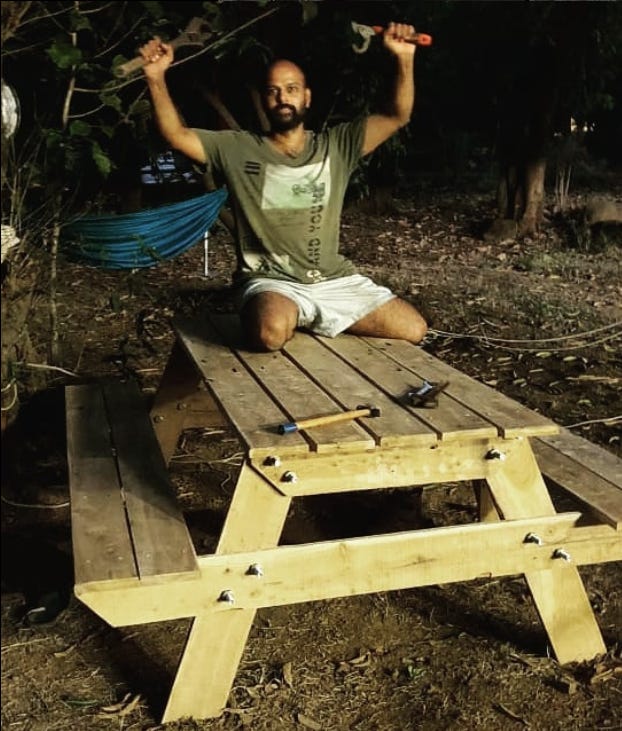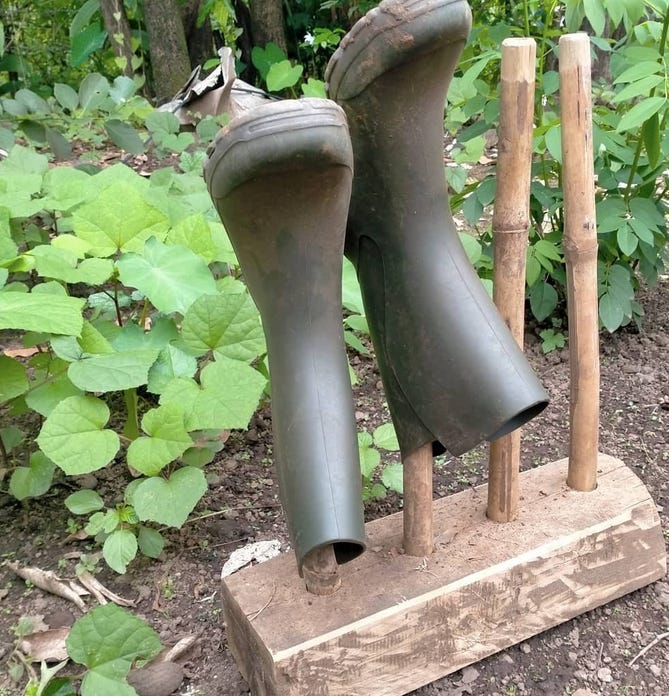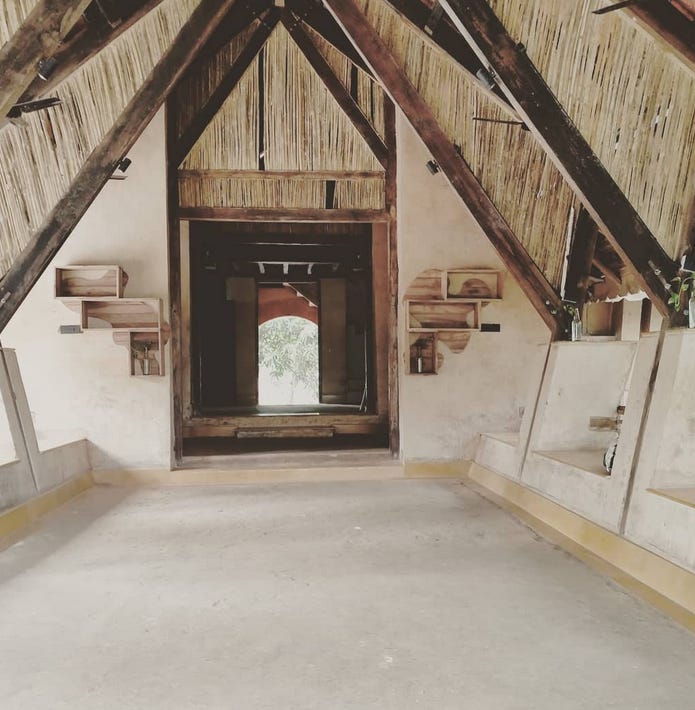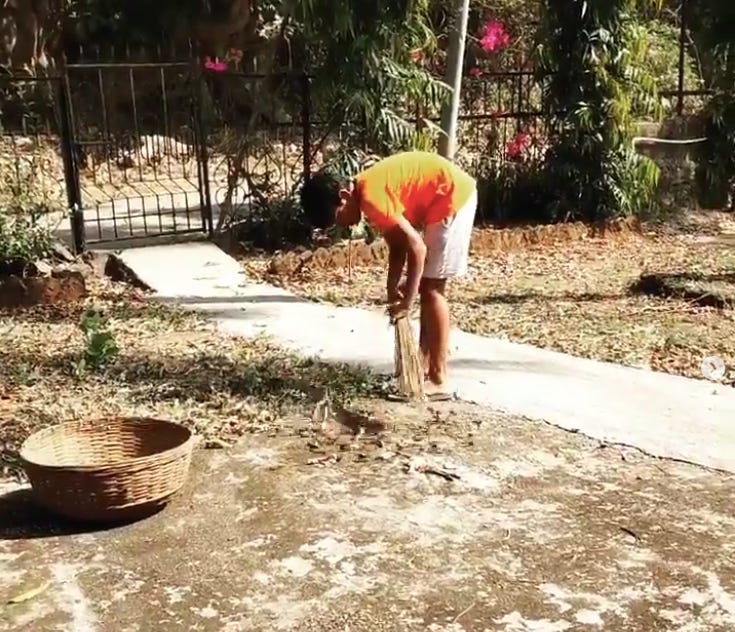If you are new here, please see my previous newsletter for context and the first story. Please click here for Chapter 1 of Viren Vaz.
At Mohraan, Viren and his son were warmly welcomed by Sachin’s family, which included his twin brother, their wives, and his son. Together, Viren and Sachin constructed a 1,000-square-foot workshop using bamboo and tarpaulin. They built chairs and tables and renovated various areas of the farm stay. Their daily routine began at 5 AM with a walk through the forest, followed by a coffee or chai, then working until lunch at 11 AM. An afternoon siesta lasted until 2 PM, after which they resumed their work in the workshop.
Viren was also immersed in the concept of Unschooling, which posits that after the age of eight, parents should act merely as a support system, providing resources and space for the child to learn autonomously i.e. the child can do as they like because they know the best way for them to be successful. The child, in essence, teaches the parents. This radical idea resonated deeply with Viren. He realized that his son needed to be de-schooled to be unschooled, allowing him to voice his own opinions and perspectives. Whenever Viren instructed his son, Sachin asked, “Why are you asking him to do it this way?” Although initially frustrating, Viren recognized the importance of questioning fundamentals and redefining them, not just for himself but also for his son. You just can’t ask your son to do certain things simply because that’s how it’s done. Unschooling taught Viren to relinquish control, understanding that just as his own path was evolving, his son would also learn to manage himself.
After almost a year in Mohraan, external influences began to question Viren’s role on the farm, souring the atmosphere. Recognizing it was time to leave, Viren received a timely invitation from his ex-manager at Oracle to take care of his summer house in Tala, a village in the Raigad district of Maharashtra, in exchange for free lodging. In May 2021, Viren and his son moved to the laid-back Konkani village. Reflecting on his life, Viren said, “I have experienced this many times that when I need something the most, something will happen and I just have to be ready to take it. That is the theory I continue my life now. Something changes and you have to be ready to take it.”
Every morning, Viren would leave a note for his son that dosa batter or chutney is in the fridge and then leave for 3-4 hour long walks with his DSLR, climbing hills and capturing the beauty of the hills and birds. His son, meanwhile, would prepare his own breakfast or buy vada pao or missal pao while chatting with the villagers. Within a month, everyone in the village knew the father-son duo. The fear instilled by urban living that people are more often evil than compassionate began to fade. Viren would cook and wash clothes, while his son helped with cleaning the house, washing dishes, and drying clothes. Their relationship was evolving, he recalls an interesting incident.
“One day, my son said, ‘Dadaa, you’ve been throwing gunpowder at me all day. What’s the problem? You’ve been mean and snippy about everything I do. What is irritating you?’ So I am like WTF this is about? Then I realised that I had been handwashing clothes, cleaning and cooking for both of us all alone, reducing my time for walks. It’s a 1000 sq ft house! So I told him ‘WTF man! Some help would be nice for maintaining the household!’ My son says to me ‘Why do you have to clean every day? Why don’t you clean every three days? I can’t wash clothes but I can sweep an extra room and dry clothes.’ It struck me that being open about my problems could lead to solutions from my son rather than nitpicking stuff.”
After nine months in Tala, Viren began to miss woodworking. Around this time, a friend invited him to Ganeshpuri, a village 2.5 hours from Bombay, to start a workshop building percussion instruments like cowbells, flutes, clap boxes, and bongos. These instruments, ideal for teaching music to children, promised a good market in Bombay. This resonated with Viren because it was teaching and from a business POV parents would do anything if you say to them it’s for their kids. Believing in the project, Viren invested Rs 1 lakh, because his friend had none believing he would recoup it later on from sales. While his friend took care of Viren’s food and accommodation. About this decision, Viren says
“I believed in this project so I invested Rs 1 lakh and with this started my decisions that I refuse to regret but secretly I do regret.”
Knowing he would eventually move on, Viren found an apprentice, Akshay, to train in making musical instruments and woodwork. By October 2022, Viren had crafted 15 cowbells and clap boxes. However, his friend continually found faults, delaying the marketing and sales. Realizing the partnership was untenable, Viren decided to withdraw. But, he felt responsible for Akshay’s training and the business setup. Determined, Viren decided to restart in Ganeshpuri.
P.S: If you liked what you read please show your appreciation by filling the heart below with some love.






